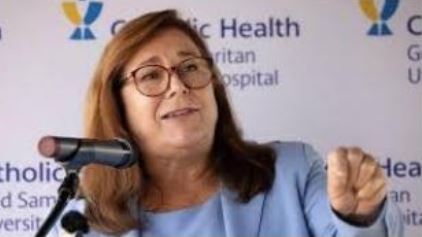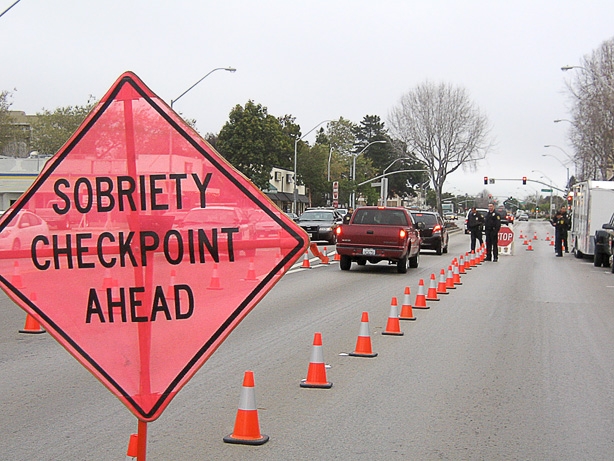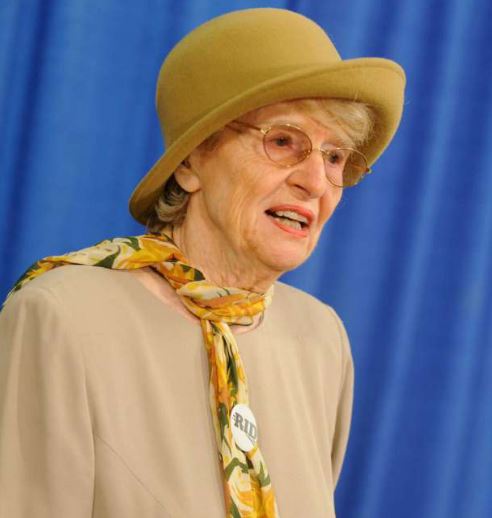“Remove Intoxicated Drivers” – National Headquarters
The Nation’s longest serving Anti-DWI National Organization in the United States, founded in 1978 by Doris Aiken.
Doris began the battle against drunken driving when she learned of the deaths of Karen (17) and Timothy (19) Morris, who were killed by an intoxicated 22-year-old driver in Scotia, NY on December 4, 1977. They were the Morris’s only children. When Doris Aiken called the Schenectady County District Attorney on the family’s behalf, she was told to mind her own business. That phone call inspired Aiken to form RID, the first organization in America dedicated to fight drunken driving.
In 1982, RID led that passage of 8 bills that prohibited plea bargaining out of alcohol offense. New York was the first to pass such laws. Many other states soon followed suit. In 1984, RID supported U.S. Surgeon General C. Everett Koop’s recommendation to lower the BAC level. Decades later science has proven Everette was correct. Lowered the BAC has become the focal point of RID’s work. RID relies on volunteer citizen activists to promote legislation that saves lives. .
During the Covid shutdown, RID decided our administrators would no longer draw a salary. So 100% of RID’s income goes toward the costs of our newsletter production, the operational expenses of our website and our postal fees. Funds raised by RID Chapters are used solely for programs in their local communities. RID-USA does not receive any funding from the Alcohol Industry.
Shout out to Maureen McCormick 
Maureen McCormick, ADA Suffolk County
Several years ago, I joined Suffolk County ADA, Maureen McCormick’s email chain. Since then I’ve received a steady flow of announcements regarding her efforts and events in the New York State Legislator. She has worked tirelessly in building a powerful and diverse coalition of advocates who are aligned in fighting to improve road safety in New York State.
McCormick’s bill, the “Deadly Driving Bill” (S.5457/ A.3981), seek to make New York’s drugged driving laws applicable to all dangerously impaired drivers; not just those impaired by drugs on a statutory list. The bill would close loopholes in the laws that currently allow for defense attorneys get their clients off from being held accountable. She has done an exemplary job of educating the public on the problems with our current system as well as illustrating how her bill would correct those flaws.
As most of you know I have been trying to pass a New York State bill (S.53/A.1232) to lower the BAC since 2013. At times, the lack of progress has been extremely frustrating. So I’m in awe of McCormick’s resilience and perserverance. She hasn’t been deterred by the stiff resistance. Passing effective, common sense life saving laws should be a no brainer. That this decades old struggle continues is a reflection of the power and influence of the lobbying interests of defense lawyers and the alcohol industry.
The opposition uses emotional arguments, not scientific studies. They’ve been successful in thwarting legislation that would save lives. McCormick has been instrumental in countering that narrative. She testified at transportation committees to establish an official record of the flaws in our legal system, which defense lawyers profit from at the expense of citizen safety.
I am confident that McCormick’s’ dedicated efforts and gumption will win out in the end. Anyone would get discouraged and throw in the towel. That she remains committed to making the roads we share safer is a testament to her valiant service to the community.
Thank you, Maureen!
I sat down with WAMC’s David Guistina for an interview on his show, Capital Connections.
I detail the history of RID as well as the saving life benefits of NYS’s .05 bill.
The Capitol Connection – William Aiken, President of RID, Remove Intoxicated Drivers
NBC Interview: .05 sends a message before the driver gets behind the wheel.
CBS Interview: The Current DWI Laws Have Failed Us. They Are Unacceptable!
RID Honors Heroic Officer
Remove Intoxicated Drivers issued an award to Officer Morgan Smith of the Sidney police department for her amazing story of recovery, perseverance and collaring the drunken driver. I want to give a heartfelt shout out to Rene Barchitta for making this event possible. Upon hearing Officer Smith’s story, Rene urged me to honor her fortitude and bravery. RID is grateful to pay tribute to the outstanding merit of law enforcement officers, like Morgan Smith. Now more than ever, the public needs to support law enforcement.
William Aiken,
President, Remove Intoxicated Drivers
.05% BAC Law Featured on CBS 6 Albany
“Once again legislation has been proposed to lower the BAC limit from .08 to .05, and on Friday, the New York State Assembly Transportation Committee held a hearing with experts and witnesses to discuss the legislation.
…
Families who have lost loves to drunk drivers told their stories to lawmakers, advocating for change.
“Each of the losses of the people here standing and the people of New York State and nationwide,” Alisa McMorris, whose son Andrew was killed by a drunk driver, said. “They’re brothers and fathers and children and grandparents and cousins and friends, and Andrew cannot be just another statistic.”
NHTSA: Utah’s .05% Law Shows Promise to Save Lives, Improve Road Safety
New study shows lowering impaired driving legal limit reduced fatalities with limited increase in arrests, no economic losses in 2019
February 11, 2022 | Washington, DC
The National Highway Traffic Safety Administration has found that traffic deaths in Utah decreased, and more drivers said they arranged for sober rides home, when the State lowered its impaired driving legal limit to .05%.
In a new study published today, NHTSA found Utah’s fatal crash rate dropped by 19.8% in 2019, the first year under the lower legal limit, and the fatality rate decreased by 18.3%. The fatality rate measures the number of fatalities over total vehicle miles traveled, whereas the fatal crash rate measures the number of crashes involving a fatality over total vehicle miles traveled.
In 2019, despite increased vehicle miles traveled, Utah recorded 225 fatal crashes and 248 fatalities, lower than the 259 fatal crashes and 281 fatalities in 2016, the last full year before Utah voted to lower the blood alcohol level to .05%. Utah is the first State to adopt the .05% blood alcohol concentration limit.
Utah’s drop in crash and fatality rates was a significant improvement over the rest of the United States during the post-implementation year studied, which had a 5.6% fatal crash rate reduction and a 5.9% fatality rate reduction in 2019. The neighboring States of Arizona, Colorado, and Nevada did not show the same levels of improvement in fatal crash and fatality rates as Utah.
“Utah typically has one of the lowest rates of impaired driving fatalities in the nation, but this study shows that all states have room for improvement. As our study shows, changing the law to .05% in Utah saved lives and motivated more drivers to take steps to avoid driving impaired. NHTSA conducts research on the effectiveness of countermeasures to improve safety on the nation’s roads, and this study will be a useful tool for other States considering a move to .05%,” said Dr. Steven Cliff, NHTSA’s Deputy Administrator.
In 2019, more than 22% of those who drank alcohol indicated they had changed their behaviors once the law went into effect. The most common change was ensuring a sober ride was available when drinking away from home, an encouraging sign.
NHTSA also found none of the economic impacts that had been predicted with the change from .08% to .05%. Alcohol-impaired-driving arrests did not climb sharply after the law went into effect, as some had feared. In 2016, the last full year before Utah voted to change the law, 8,828 arrests were made. Under the new law in 2019, 8,512 arrests were made. Impaired driving arrest numbers in Utah have remained fairly consistent in recent years, except for a dip in 2018.
Full report: Evaluation of Utah’s .05 BAC Per Se Law
NHTSA
Assemblywoman Simon is the new Sponsor of .05 BAC Bill in New York State

Assemblywoman Simon
District 52 Brooklyn
Since January I have been actively seeking a replacement for Asst. Speaker, Felix Ortiz, who wrote the original .05 bill in 2013. Unfortunately, the Asst. Speaker was defeated in the 2020 Democratic primary. This search was made more difficult since we were still in the middle of the pandemic and the shutdown of the Capital. So I’m happy to announce that Assemblywoman Jo Anne SImon representing Brooklyn has agreed to introduce the Assembly version of the .05 bill, AO7197, which will lower the legal BAC from .08 to .05 and lower the aggravated BAC threshold from .18 to .12.
In 2004, she was elected female District Leader and State Committeewoman for the 52nd Assembly District. The Assemblywoman was one of 15 co-sponsors of the previous .05 bill. RID is happy to have someone with her background and experience to help navigate the bill through the rigorous legislative process. I want to thank Assemblywoman Simon and her staff for stepping up in this leadership role. I’m planning a press conference at the Capital to announce the assemblywoman as sponsor of the bill. There will be road safety and victim advocates speaking about the merits of AO7197 at the event as well. I will post the date once everything has been finalized.
RID on NBC Channel 13 about lowering BAC
Click the image or link below to view
ABC News 10 Does Great Report Explaining the .05 Bill in NYS
Click on link below:
CBS 6 INTERVIEWS AIKEN
William Aiken, Vice President of RID explains why lowering the
legal BAC to .05 is necessary and how this bill will save lives
Al Crancer November 1933 – July 2019
It is with sorrow that we announce the passing of RID’s California Chapter head, Alfred Crancer. Al was a passionate voice for road safety, particularly combating the push for Marijuana Legalization. He was a meticulous researcher, who dug deep into the data of drunk driving to explore what policies can be implemented to save lives.
In addition to being a regular contributor to RID newsletters, Al has published numerous research articles published in various journals including Science, Journal of the American Medical Association, and the American Journal of Psychiatry and has US Patents. Following his retirement, he started Crancer and Associates, a research firm that conducted statistical research and analyses in traffic safety issues, additionally, he was well known nationally for his articles on Marijuana and its effect on drivers.
Al will be sorely missed by his family, friends and those who had the pleasure of knowing him. RIP Al.
05 SAVES LIVES
Contributions to RID-USA go towards producing the RID newsletter, Producing anti-DWI programming for SACC TV, supporting policies that reduce DWI fatalities, monitoring court cases, promoting victims advocacy and raising DUI awareness.

Looking Down the Road is a TV show that examines the intersection of the law and road safety. To view my interview with Albany Chief Vehicular Crime Unit, Mary Tanner-Richter click on the link directly below:
Looking Down The Road with guest Mary Tanner-Richter
|
To view my interview with Schenectady DA Robert Carney below. To view my interview with Educator/ Entrepreneur, Phil Abitabile copy, paste the link below into your browser.
TAKING PART IN THE LEGISLATIVE PROCESS
RIDs partnership with LegiCrawler allows you to have access to up to date information on Legislation. If you live in New York, you access DWI legislation that is pending in your State. Click on the link below, select New York state and click on the search button. The pending bills are updated daily basis in real time. I have listed four steps below how citizens can use Legicrawler to part the legislative process.
HOW YOU CAN MAKE A DIFFERENCE!
Doris Aiken made a difference by simply taking action to get involved in fighting drunken driving. Now nearly 40 years later, there has been tremendous progressive thanks to her fortitude, yet there is still more work that needs to be done. Gone are the days when you could walk into an elected officials’ office to lobby a particular bill. Over the years, the layers of staff and bureaucracy have grown to insulate our elected leaders which have impeded the average citizen’s ability to communicate with our lawmakers.
REAL-TIME ALERTS
With technology, getting involved in the legislative process can be much easier for the average citizen as well as providing more transparency in the legislative process. The details of what’s actually in a pending bill are much more accessible to our members. Since 2013, RID has partnered with Leigcrawler, an online service provider. Here’s how it works: I have selected a list of terms and words related to drunken driving that is submitted into Legicrawler’s database. When those terms or words appear in a bill introduced by the Senate or the Assembly, a notification is sent to the RID website, which I then forward to our members.
RID has upgraded our platform with Legicrawler. Now when you click on the feed, it will take you to the NYS legislative webpage where you will can select the options below for the bill.
- Floor Votes Memo Text
- LFIN Chamber Video/Transcript
[wp-rss-aggregator]
BE INFORMED
A summary of the bill, its sponsors, co-sponsors as well as the bill’s full text is included in the notification. I route out bills that aren’t of interest and pass on the ones that where an expressed interest has been indicated by our members. The contact information of the bill’s sponsors are available so you are network and coordination a strategy to help get the bill passed.
It’s important to take the time to read the full text of the bill. Being well verse will allow you to be a more effective advocate. If you want to write a letter to the editor or make post on social media, you should be able to articulate the benefits of the bill as well as be prepared to address arguments against the bill.
FOLLOW THROUGH
Bills go through at least three processes before they can be voted on in their respected branch before it reaches the Governor’s desk. Whether a bill is introduced by the Senate or the Assembly, there has to be a comparable bill in the other branch. A heat index rates each bill from 1 to 10 to determine its status in becoming signed into law. Legicrawler sends RID a notification whenever a bill progresses further in the legislative process. Having this information is useful to plan the next action with the bill’s sponsor. The sponsor can better advise RID members who are up to speed on the latest legislative developments as the strategy changes as the bill moves forward.
ROLLING WITH THE TIMES AND CHANGES
Times have changed from the days when you could stroll into a politician’s office to lobby a bill, like Doris Aiken did back in the day. The elected offices have become political fortresses that don’t encourage the participation of it’s citizens. But thanks to the internet and Legicrawler, you have access to a platform where your voice can be heard, your effectiveness is maximized and you can truly make a difference. So if you live in California, Florida, Kentucky, New York, Tennessee or Vermont RID is ready to help you connect to the legislative process. If you live outside of these states and want to get involved, please contact me to discuss your interests and join RID, the nation’s longest serving anti-drunk driving organization dedicated to fighting drunken driving.
Let’s Make a Difference!
William Aiken, Vice President ridusa@verizon.net (518) 372-0034
Remove Intoxicated Driver to unveil plaque honoring Founder Doris Aiken
Remove Intoxicated Drivers in conjunction with Ellis Hospital will be holding a memorial ceremony in recognition of RID founder, Doris Aiken, who started the nation’s first anti-drunken driving organization in Schenectady, NY on February 15, 1978. A plaque listing her accomplishments in the field of drunken driving will be unveiled at Ellis Hospital. Aiken spearheaded the first laws in New York State prohibiting DWI offenders from plea bargaining out of alcohol charges in 1982. She was instrumental in getting the first victim impact statements read at sentencing hearings. Later, on the national stage, she was instrumental in raising the drinking age to 21 and lowering the BAC level from .10 to .08.
In 2008, Aiken conceived the idea of the Safety Tree, where each red light bulb represents a life lost to a drunken driver. To conclude the ceremony a green bulb will be added to the tree to honor Aiken for all the lives she helped saved.
New York State Senator Jim Tedisco, Schenectady District Attorney, Robert Carney and Mayor Gary McCarthy are scheduled speakers. RID is extending invitations to victims who have lost family members to drunken drivers to speak as well. The event will be held in Schenectady at the Safety Tree at Ellis Hospital located by the Nott Street Bus Depot and is scheduled to begin at 10AM on September 25th, 2017. Hope to see you there!
GO FUND ME TO START RID DIGITAL LIBRARY
Doris Aiken was a shining star igniting hopeful energy among the victims of drunken driving crashes for decades. She was a courageous visionary who came up with new ideas to empower citizens to make the highways safer.
Her organization, “RID – USA” was born in 1978, inspiring victims to form local chapters and educate the public, court watch, lobby officials and hold victim impact panels, just to name some of the activities. Doris had a clarity, verve and personal charm, but most of all great integrity. RID-USA never accepted alcohol industry money and pursued the goals against drunken driving and teenage binge drinking without compromise.
She passed away this March but we do have a catalogue of VHS recordings from training conferences, lectures, talk shows and events documenting the movement of public resistance to the permissive culture around drunk driving crashes.
We now want to transfer those recordings to digital format and make video clips available on the RID website for everyone to access. In addition we hope to edit some of the body of work into a new documentary on the movement against drunken driving. With your help of any donation we can begin this project immediately since the stubborn problem of drunken driving has not gone away.
Doris knew that citizens have enormous power to make real change and she tirelessly shared her vision which still resonates today. If you would like to see her work carried, please consider a donation to this project. https://www.gofundme.com/memorial-library-citizen-activism
Thank you for your support to our Memorial video library!
Doris Aiken, 90 passed away at her home following a hospitalization. Doris will be remembered for being a trailblazing pioneer and activist, who was the forerunner in getting society to treat drunken driving seriously as a matter of life and death in this country.
She was born in 1926 to Adam Hastings Crouthamel and Eva Brown Crouthamel in Souderton, PA. She graduated from Souderton High School in 1944, and then she worked for an insurance company in Philadelphia for seven years. She moved to Los Angeles to attend UCLA where she graduated in with a BA in sociology. While attending UCLA, she met the love of her life, William Aiken Sr. and on November 4, 1956 they married in Santa Monica, CA.
Doris got her start in activism as trainer of job skills for poor minority women working for the legendary former Congresswoman, Barbara Jordan in Houston, TX. She continued to pursue her interest in social issues working for the charity Save the Children in Westport, CT. In 1972, she moved to Niskayuna and ran as a Democrat for the 107th Assembly District seat and lost in November of 1974.
While Doris was hosting a TV show for at Channel 6 WRGB, she learned of a local case where a teenaged brother and sister were killed by a drunken driver. This event inspired her to start RID (Remove Intoxicated Drivers in 1978. RID was the first anti-drunken driving organization in the nation. Through Doris’s appearances on Phil Donahue, 60 Minutes and the Today Show, RID quickly expanded to over a 160 chapters in 41 States.
In 1982, Doris successfully fought to pass the nation’s first law that prevented the common practice of DWI offenders’ plea bargaining out of alcohol charges. In 1984, she worked with Congressional Democrats and Republicans passing the nation’s 21 year old drinking age and later supported lowering the BAC limit from .10 to .08 in 2000.
Her success came from word of mouth before the age of the internet or social media. Her work won citizen Awards from Presidents Reagan and George H W Bush. In 1997 in Annecy, France, ICDATS (The International Council on Drugs, Alcohol and Traffic Safety) presented her with the Widmark Award, an international recognition of citizens who have achieved success in improving the areas concerning drugs, alcohol and traffic safety.
In 1987, Doris published a book, “The Media Game and how to play it”, a practical guide on crafting your message and how prepare to deal with the media. She later published her memoir “My Life as a Pit Bull: Collaring the Drunken Driver”. In 2008, UCLA recognized Doris with a Lifetime Community Service Award for her work with RID.
Doris was an inspiration to many, giving them a blueprint how to get involved in the issue of drunken driving. She never allowed disappointments or setbacks deter her focus of getting victims’ families justice. She was quick to praise others and give credit where credit was due. Early on in RID, she took on powerful entities such as the alcohol industry and the defense lawyers. Her criticism of alcohol advertising led to RID being banned by the national media, however, thousands were motivated to join RID as a result.
She was an excellent cook with a quick wit. An avid reader, she could engage in politics and culture with anyone. Her infectious smile lit up the room. She adored her 150 lb St. Bernard mascot, Gracie. She truly cared about people and fought vigorously to raise awareness on the importance of driving sober as well as the dangers of alcohol poisoning.
Few would have predicted that Doris who came from such humble beginnings would have a profound impact on such a stubborn problem. Her tough tactics saved thousands of lives. She deserves a lot of credit for changing how society views drunk driving. No longer is it considered to be an accident. It’s rightfully viewed as a crime, thanks in large part to her committed efforts. Doris Aiken was someone who truly made a difference. She will be missed by many who had the pleasure of knowing her. Her children, Jane and William will continue RID’s legacy of making our roads and highways safer for everyone.
Doris was predeceased by her parents, her sister, Jean Stewart and husband, William Aiken Sr. who passed away in 2004. She is survived by her children, Jane, William and Raya Buckley (Tom), her grandchildren, John and Charlotte Buckley, her Brother Dale Crouthamel (Gladys) of Telford, PA along with many nieces and nephews.
The Aiken family would like to extend a special thanks to the staff of doctors, nurses and techs at Ellis Hospital who made it possible for Doris to come home to be surrounded by friends and family in her final days. And a heart-felt appreciation to Jackie Donegan, who brought grace, compassion and comfort when it was needed most.
The Aiken Family would like to thank all those who sent cards and memorial acknowledgments in honor of Doris. Your heart-felt condolences are greatly appreciated.
“Remove Intoxicated Drivers” – National Headquarters
The original Anti-DWI National Organization in the United States, founded in 1978 by Doris Aiken.
Doris began the battle against drunken driving when she learned of the deaths of Karen(17) and Timothy(19) Morris, who were killed by an intoxicated 22-year-old driver on December 4,1977. They were the Morris’s only children. RID relies on volunteer citizen activists, with Chapters or coordinators in 42 states. RID was given an “A” rating among non-profit organizations by the “Independent Charities of America”. Only 2000 organizations out of 1 Million reviewed receive this Award.
RID stands alone in spending 80% of funding on programs, only 20% on administration. No professional fundraisers are used. Funds raised by RID Chapters are used solely for programs in their local communities. RID-USA does not receive funds from the Alcohol Industry
Contributions to RID-USA go towards our support of DWI victims advocacy and DUI awareness.
Aiken still passionate about the cause she started


18 to 21. (photo provided)
Faith in people
Remove Intoxicated Drivers hosted a Safety Tree Event at Ellis Hospital
Photo/ Steven Cook Daily Gazette
RID HONORS THREE VICTIMS WITH
SAFETY TREE LIGHTING CEREMONY
A brisk, cool spring day served as a backdrop to the first ceremony honoring victims with the Safety Tree Lighting Event at Ellis Hospital. In 2008, RID president, Doris Aiken conceived the idea of having a Safety Tree as a way to pay tribute to those who lost their lives to drunken drivers. RID Vice President, William Aiken, Schenectady Mayor Gary McCarthy and Schenectady District Attorney Robert Carney all spoke at the event, delivering passionate speeches on the importance of driving sober while still acknowledging the enormity of the problem.
On September 4, 2015 in Duanesburg, NY, Betty Brockhum, Vanessa Cohn and Summer Penney were returning from a back-to-school shopping trip when their vehicle was struck head on by an SUV driven by Joseph Duffy, 27 who was attempting to pass several cars ahead of him. Cohn was killed instantly, her daughter Penney died soon after while Brockhum died from her two weeks later from her injuries. A grandmother, mother and daughter representing three generations in the same family are gone today because someone refused to obey the law to driver sober.
Three red lights replaced white ones on the safety tree to symbolize the deaths of these three women. . A second Safety Tree was established in Hudson, NY where six victims who lost their lives to drunken drivers have been honored since 2011. The Hudson Safety Tree represents Columbia and Greene counties.
Alcohol Overdose facts and fatality information in DVD, “Without Warning”. Parents who have lost their teenager children to AOD. DVD on binging (Without Warning) DVD. Information on effects of high BAC and lower BAC findings. RID was formed two years prior to MADD.RID supports and advises SADD teachers and leaders in High Schools. RID supports ignition interlocks, a technical lock on car starters. Tests blood alcohol level on breath of driver. Cars won’t start if .02 BAC or higher is present. Please read our current RID Newsletter CITIZEN ACTION NETWORK REMOVE INTOXICATED DRIVERS If you are a victim of a drunk driver, here are the necessary steps you need to pursue justice. You have a right to the police report of the crash and you have a right to make a request to give a victim impact statement to the Court. If you have a police report, you may want to contact the District Attorney in the County where the crash occurred. If you don’t have a police report, you need to contact the police department in the jurisdiction where the crash occurred and request one be sent to you. If you click on the link below, then select the County in New York State where your case is being adjudicated. You will find the necessary contact information for the police department, District Attorney and the County Clerk’s office. Ask the County Clerk to inform you about any dates regarding your case. If you wish to make a victim impact statement, you should contact the County Clerk’s office. If your case is being handled outside of New York State, follow the same guidelines listed here once you have found the correct County Website. www.nysegov.com/citguide.cfm?context=citguide If you have any further questions regarding this process, contact RID at ridusa@verizon.net
Activism Then and Now
By Doris Aiken
When I started Remove Intoxicated Drivers there was no Facebook or Twitter to organize or rally the troops around. Our first meeting took place in the Unitarian Church in Schenectady. A local newspaper reporter covered the event and wrote an article the next day that featured my phone number. I was surprised by the volume of calls I received from angry victims who felt they had been denied justice.
I met with Janet Bessie, an activist from Rochester and began to network with her, building contacts with victims of drunken driving. It wasn’t until I appeared on “The Phil Donohue Show, two years later that RID really took off. We grew from a few chapters in New York State to a national organization with 62 chapters in 42 States. RID succeeded in advancing the first victim impact statement in New York State for DWI cases.
Shortly after the Donahue appearance, a group of activists concerned about the negative effects of advertising alcohol banned together to form the SMART (Stop Marketing Alcohol on Radio & Television) campaign. When they ask me to join their campaign, I agreed, not realizing the repercussions of that decision.
Once the TV Broadcasters caught wind of my association with the SMART campaign, they viewed RID as a threat to their bottom line. Thus, the invitations to appear on national television began to disappear. Many of the major newspapers and magazines were heavily funded through alcohol ads. They didn’t appreciate my connection to the SMART campaign either. So RID got the cold shoulder from the print media as well.
I even did an interview with 60 Minutes that took three hours to film and it was cut out from the segment entirely. 60 minutes showed a few seconds of our volunteers participate in court watching. My choice to be part of the SMART campaign almost crippled RID. Other anti-DWI organizations that chose to take money from the alcohol industry benefited from our media blackout.
Today, RID is taking advantage of social media to get our message out to the public. We have partnered with an on-line legislative service, “Legicrawler”, which allows us to monitor and track bills concerning DWI and Alcohol policy. RID receives reports on the status of DWI bills in five states on a weekly basis or whenever there’s movement on a bill. Legicrawler helps RID to strategize with our chapter leaders about which bills to support.
Our website has news articles, opinion pieces and comments from our readers. The Website also features RID’s Citizen Action Network which instructs victims how to navigate the legal system and who they need to contact regarding how to follow up on their case. If you have a concern or need to reach me, you can contact me at ridusa@verizon.net or call our toll-free number (888) 283-5144.
I have been in this business of advocacy for 37 years. You have to adapt to the curveballs life throws at you. There have been enormous changes that have taken place in technology since we started. Luckily, I have a great staff, engaged board members as well as energetic chapter leaders that allow RID to succeed in meeting the many challenges posed by drunken driving. Your support makes it possible for RID to continue to fight the good fight.
Thank You!
Doris Aiken, President
Remove Intoxicated Drivers
The President’s Letter: Messaging Matters
By Doris Aiken
Al Crancer’s report on the public service announcement and their effectiveness in combating drunken driving confirms what I have believed for a long time; when it comes to deterring drunken driving messaging matters.
With so much at stake, our government has to pay better attention in monitoring what’s the best approach to warning young people in particular, the importance of driving sober. Peer pressure is a huge factor among youth in doing the right thing or the wrong thing. Tapping into that element should be a key focus of sending a successful message.
Mr. Crancer’s report reflects on what’s succeeded and what has failed. I shouldn’t be too critical of NHTSA (National Highway Traffic Safety Administration) since analyzing these trends can take a long time. However, now that we have clear data that the earlier messaging was far more effective, there needs to be a return to the Public Service Announcements that were more direct in connecting with young people.
I worry that the decision makers place more value on sending messages that are politically correct and put less emphasis on the track record of success. Corporations often go back to using slogans that were successful in the past. Why can’t our government take a page from the private sector’s playbook by bringing back a campaign similar to “Friends Don’t Let Friends Drive Drunk”?
Any serious effort by the Government to educate and deter young people from driving drunk should incorporate primary messaging as a central theme of the campaign. As Al Crancer points out the recent campaigns, such as, “Drive sober or get pulled over”, and “Drunk driving is buzzed driving” have shown to correlate with higher DWI rates over the years. NTHSA’s own data proves this point. So let’s encourage NTHSA to learn from its history by putting together the most effective messaging to help keep the roads we share safer for everyone.
Note: Al Crancer’s full report on effective messaging by NTHSA will appear in the RID Spring Newsletter.

LegiCrawler Service is now available through RID see link below
While we don’t advocate any specific legislation we now provide access to this link for informational purposes.
RIDs partnership with LegiCrawler allows you to have access to up to date information on Legislation in your State.
Please follow the link below , Choose your State, and then enter your search www.legicrawler.com/ridn/adm.html

Please visit our new Facebook Page where you can get the latest news and post your feedback on Remove Intoxicated Drivers. Project RID-C.A.N.(Citizen Action Network) utilizes action network. Members of RID refer victims to key officials in their locality to get involved in their own case situation. Instructions given to RID volunteers. Court watch project. Binge drinking and teenage addiction. Special effect on teen drinkers who’s brains are not fully developed. DVD (Without Warning). DWI victim advocates RID members volunteer to sit with victims in court sessions, acquaint them of their rights.







